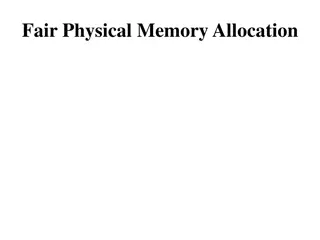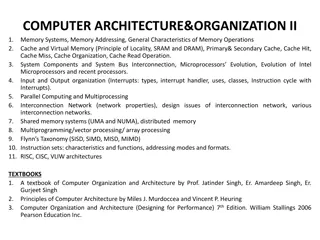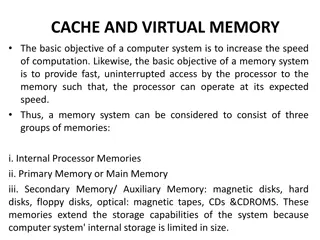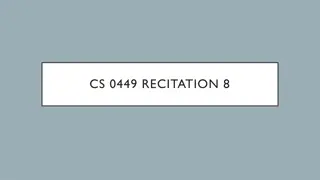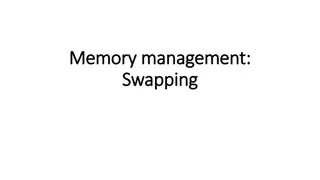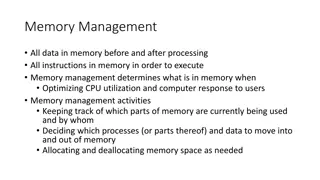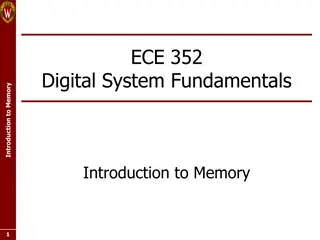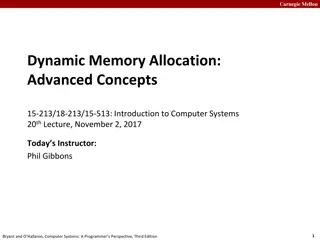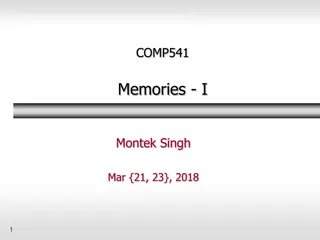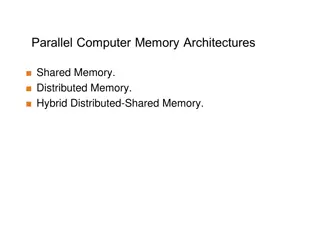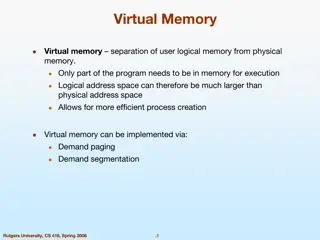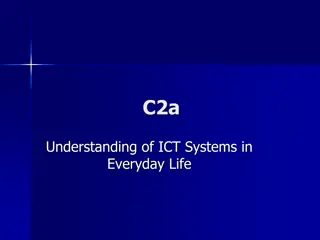Understanding Memory Management in Computer Systems
Dive into the intricacies of memory management with Chapter 5 by Mooly Sagiv. Explore topics such as heap allocation, limitations of stack frames, currying functions, browser events in JavaScript, static scope for function arguments, result of function calls, closures, and more. Gain insights into memory reallocation, dynamic memory allocation, function activations, and JavaScript function results and closures.
- Memory Management
- Computer Systems
- Mooly Sagiv
- Heap Allocation
- Stack Frames
- Currying Functions
- JavaScript Events
- Closures
Download Presentation

Please find below an Image/Link to download the presentation.
The content on the website is provided AS IS for your information and personal use only. It may not be sold, licensed, or shared on other websites without obtaining consent from the author. Download presentation by click this link. If you encounter any issues during the download, it is possible that the publisher has removed the file from their server.
E N D
Presentation Transcript
Memory Management Chapter 5 Mooly Sagiv 1
Announcements Sample exams end of the week Hazara class & advanced topics next week Next week recitation solve sample exams Extra office hours TBD 2
Topics Heap allocation Manuel heap allocation Automatic memory reallocation (GC) 3
Limitations of Stack Frames A local variable of P cannot be stored in the activation record of P if its duration exceeds the duration of P Example: Dynamic allocation int * f() { return (int *) malloc(sizeof(int)); } 4
Currying Functions int (*)() f(int x) { int g(int y) { return x + y; } return g ; } int (*h)() = f(3); int (*j)() = f(4); int z = h(5); int w = j(7); 5
Browser events (Javascript) Mouse event causes page-defined function to be called <script type="text/JavaScript"> function whichButton(event) { if (event.button==1) { alert("You clicked the left mouse button!") } else { alert("You clicked the right mouse button!") }} </script> <body onmousedown="whichButton(event)"> </body>
Static Scope for Function Argument { var x = 4; { function f(y) {return x*y}; { function g(h) { int x=7; return h(3) + x; }; g(f); } } } Code x 4 for f f g Code h g(f) for g x 7 y 3 h(3) x * y local var follow access link How is access link for h(3) set?
Closures Activation records in the heap Function value is pair closure = env, code When a function represented by a closure is called, Allocate activation record for call (as always) Set the access link in the activation record using the environment pointer from the closure
JS Function Results and Closures function mk_counter (init) { var count = init; function counter(inc) {count=count+inc; return count}; return counter}; var c = mk_counter(1); c(2) + c(2); mk_c Code for access mk_counter c access mk_counter(1) init 1 count counter 1 3 c(2) access inc 2 Code for counter
Duration The duration of a variable is the interval of time in which its value persist Examples Automatic variables in C [block entry, block exit] Frames in C Frames in JS 11
Program Runtime State Code segment Stack segment fixed heap Data Segment Machine Registers 12
Data Allocation Methods Explicit deallocation Automatic deallocation 13
Explicit Deallocation Pascal, C, C++ Two basic mechanisms void * malloc(size_t size) void free(void *ptr) Part of the language runtime Expensive Error prone Different implementations 14
Memory Structure used by malloc()/free() 15
Memory Structure used by malloc()/free() 1KB/0 p= malloc(100) 100/1 896/0 q= malloc(100) 100/1 100/1 792/0 free(p) 100/0 100/1 792/0 16
Simple Implementation (Init) first Chunk size free Pointer size last Chunk Pointer 17
malloc implementation function malloc(size) returning a polymorphic block pointer pointer = next_free_block(size) if pointer null return pointer coalesce_free_chunks() pointer = next_free_block(size) if pointer null return pointer return a solution to out of memory with size 18
Next Free Block function next_free_block(size) returning a polymorphic block pointer size free pointer = first_chunk_pointer size free requested_size = size + administration_size; while pointer last_chunk_pointer do if pointer.free && pointer.size requested_size split(pointer, requested_size) size free pointer.free = false; return pointer + administrative_size pointer = pointer + pointer.size od 19 return null
Splitting Chunks split(pointer, requsted_size) requested_size leftover_size = pointer.size requested_size if leftover_size > administrative_size pointer.size = requested_size leftover_pointer = pointer + requested_size leftover_pointer.free = true leftover_pointer.size = leftover_sizs 20
Coalescing Chunks coalesce_free_chunks size free pointer = first_chunk_pointer while pointer last_chunk_pointer do free size coelsce_with_followers(pointer) if pointer.free pointer = pointer + pointer.size size free coalesce_with_followers(pointer) next_pointer = pointer +pointer.size while next_pointer last_chunk_pointer and next_pointer.free do pointer.size = pointer_size + next_pointer_size 21 next_pointer = next_pointer + next_pointer.size
Implementing Free free(pointer) chunk_pointer = pointer administrative_size chunk_pointer.free = true 22
Drawbacks of the simple implementation 23
Fragmentation External Too many small chunks Internal A use of too big chunk without splitting the chunk Freelist may be implemented as an array of lists 24
Summary Explicit Allocation/Free Considerable overhead Sophisticated implementations Fragmentation Locality of references 25
Garbage Collection ROOT SET HEAP a b c d e f 26 Stack +Registers
Garbage Collection ROOT SET HEAP a b c d e f 27 Stack +Registers
What is garbage collection The runtime environment reuse chunks that were allocated but are not subsequently used garbage chunks not live It is undecidable to find the garbage chunks: Decidability of liveness Decidability of type information conservative collection every live chunk is identified some garbage runtime chunk are not identified Find the reachable chunks via pointer chains Often done in the allocation function 28
stack heap typedef struct list {struct list *link; int key} *List; typedef struct tree {int key; p q struct tree *left: struct tree *right} *Tree; r foo() { List x = cons(NULL, 7); List y = cons(x, 9); link x x->link = y; 7 y } void main() { Tree p, r; int q; link foo(); 9 p = maketree(); r = p->right; q= r->key; showtree(r);} 29
stack heap typedef struct list {struct list *link; int key} *List; typedef struct tree {int key; p q struct tree *left: struct tree *right} *Tree; r foo() { List x = cons(NULL, 7); List y = cons(x, 9); x->link = y; link } x 7 key void main() { y Tree p, r; int q; foo(); p = maketree(); r = p->right; link q= r->key; 9 key showtree(r);} 30
12 typedef struct list {struct list *link; int key} *List; left typedef struct tree {int key; p q right 15 struct tree *left: 37 struct tree *right} *Tree; r left foo() { List x = create_list(NULL, 7); right List y = create_list(x, 9); link x->link = y; 7 } 37 left void main() { Tree p, r; int q; right 59 foo(); left p = maketree(); r = p->right; 20 q= r->key; right left link 31 showtree(r);} right 9
Outline Why is it needed? Why is it taught? Reference Counts Mark-and-Sweep Collection Copying Collection Generational Collection Incremental Collection Interfaces to the Compiler Tracing 32
A Pathological C Program a = malloc( ) ; b = a; free (a); c = malloc ( ); if (b == c) printf( unexpected equality ); 33
Garbage Collection vs. Explicit Memory Deallocation Faster program development Less error prone Can lead to faster programs Can improve locality of references Support very general programming styles, e.g. higher order and OO programming Standard in ML, Java, C# Supported in C and C++ via separate libraries May require more space Needs a large memory Can lead to long pauses Can change locality of references Effectiveness depends on programming language and style Hides documentation More trusted code 34
Interesting Aspects of Garbage Collection Data structures Non constant time costs Amortized algorithms Constant factors matter Interfaces between compilers and runtime environments Interfaces between compilers and virtual memory management 35
Reference Counts Maintain a counter per chunk The compiler generates code to update counter Constant overhead per instruction 36
12 1 left p q right 15 37 1 r left right 1 link 7 2 37 left right 59 1 left 1 20 right left 1 link 37 right 9
Another Example x 38
Code for p := q if points to the heap q increment q s reference count if points to the heap p decrement p s reference count if p s reference count becomes zero then recursively free 40
Asymptotic Complexity Reference counting can be implemented with constant overhead How? 42
Lazy Reference Counters Free one element Free more elements when required Constant time overhead But may require more space 43
Reference Counts (Summary) Fixed but big constant overhead Fragmentation Cyclic Data Structures Compiler optimizations can help Can delay updating reference counters from the stack Implemented in libraries and file systems No language support But not currently popular Will it be popular for large heaps? 44
Mark-and-Sweep(Scan) Collection Mark the chunks reachable from the roots (stack, static variables and machine registers) Sweep the heap space by moving unreachable chunks to the freelist (Scan) 45
The Mark Phase for each root v DFS(v) function DFS(x) if x is a pointer and chunk x is not marked mark x for each reference field fi of chunk x DFS(x.fi) 46
The Sweep Phase p := first address in heap while p < last address in the heap if chunk p is marked unmark p else let f1 be the first pointer reference field in p p.f1 := freelist freelist := p p := p + size of chunk p 47
12 left Mark p q right 15 37 r left right link 7 37 left right 59 left 20 right left link 48 right 9
12 left Sweep p q right 15 37 r left right link 7 37 left right 59 freelist left 20 right left link 49 right 9
12 left p q right 15 37 r left right link 7 37 left right 59 freelist left 20 right left link 50 right 9


